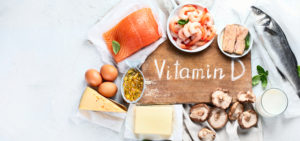We’ve all read and heard many things the last 3 months about viruses, antibodies, testing, treatments and prevention for COVID-19. I’ve hesitated to write about any natural medicines that might have a protective or intervention role… but I have found this current update on vitamin D to be safe and valuable enough, to pass along.
Vitamin D has been well known for quite a long time for its role in bone health, cardiac health, mood and even immune health. But now, there is emerging and a growing body of evidence that vitamin D status may be relevant to the risk of developing COVID-19 infection and to the severity of the disease.
Vitamin D is important to what is called innate immunity and boosts immune function against viral diseases. Innate immunity refers to nonspecific defense mechanisms that come into play immediately or within hours of an antigen’s appearance in the body. These mechanisms include physical barriers such as skin, chemicals in the blood, and specific immune system cells that attack these foreign antigens. We also know that vitamin D has an immune-modulating effect and can lower inflammation. This may be one of the relevant mechanisms involved in the respiratory response during the COVID-19 cytokine storm.
In some laboratory studies of studies of respiratory cells, some of these effects of vitamin D have been documented. In addition, it has been detected that if one has lower levels of 25-hydroxy-vitamin D in the blood (which can easily be tested in a blood test), then they may be more susceptible to respiratory infections. There is now some evidence that this is also true in COVID-19 patients. In one observational study from three different South Asian hospitals, vitamin D deficiency was much more prevalent in those individuals with more severe COVID-19 illness compared to those who were mildly ill. Specifically, there was about an eightfold higher risk of having severe illness if they had vitamin D deficiency compared to those who did not.
Two years ago, there was a meta-analysis of randomized clinical trials looking at vitamin D and acute respiratory infections. The results showed that vitamin D supplementation was associated with a 12% reduction in these acute respiratory infections. While this is statistically significant, it is small. However, if the deficiency was more profound, in the range of less than a blood level of 10 ng/ml of 23-hydroxym-vitamin D, there was a robust 70% lower risk of respiratory infection when vitamin D was supplemented.
 The best source of vitamin D is sun exposure. This leads to increased synthesis of vitamin D in the skin. While we are spending more time indoors—both winter time as well as “lock-down” guidelines, attention to vitamin D is even more important. Food sources are small so supplementation becomes the most consistent method of assuring adequate levels. If you cannot or don’t get tested, then most people will get enough from 2,000 I.U. per day of vitamin D in a pill. Some individuals will need more, at least for 3 months, if they are indeed vitamin D deficient or insufficient, which is determined from a blood test.
The best source of vitamin D is sun exposure. This leads to increased synthesis of vitamin D in the skin. While we are spending more time indoors—both winter time as well as “lock-down” guidelines, attention to vitamin D is even more important. Food sources are small so supplementation becomes the most consistent method of assuring adequate levels. If you cannot or don’t get tested, then most people will get enough from 2,000 I.U. per day of vitamin D in a pill. Some individuals will need more, at least for 3 months, if they are indeed vitamin D deficient or insufficient, which is determined from a blood test.
You can also look at food labels which list the vitamin D content. Food sources that are higher in vitamin D (although still not necessarily very much) include fortified dairy products, fortified cereals, fatty fish, and sun dried mushrooms.
Researchers are in the process of planning a randomized clinical trial of vitamin D supplementation in moderate to high doses to see whether it has a role in the risk of developing COVID-19 infections and also in reducing the severity of disease and improving clinical outcomes. I look forward to these results.
Resources:
1. Martineau AR, Jolliffe DA, Hooper RL, et al. Vitamin D supplementation to prevent acute respiratory tract infections: systematic review and meta-analysis of individual participant data. BMJ. 2017 Feb 15;356:i6583.
2. https://papers.ssrn.com/sol3/p
Mark Alipio. Vitamin D Supplementation Could Possibly Improve Clinical Outcomes of Patients Infected with Coronavirus-2019 (COVID-19). SSRN. 9 Apr 2020 Last revised: 7 May 2020
3. Raharusun, Prabowo and Priambada, Sadiah and Budiarti, Cahni and Agung, Erdie and Budi, Cipta, Patterns of COVID-19 Mortality and Vitamin D: An Indonesian Study (April 26, 2020). SSRN: https://ssrn.com/abstract=3585

